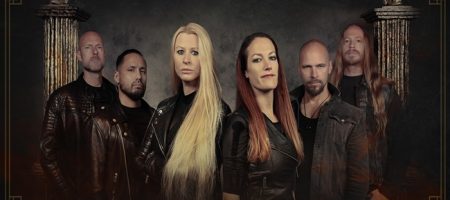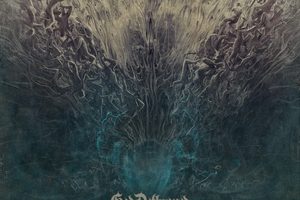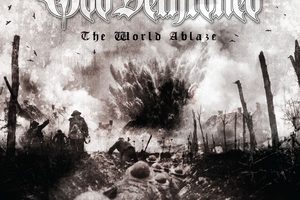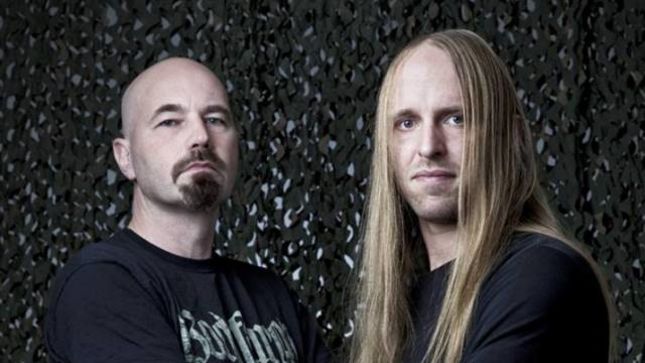God Dethroned – Blazing their Own Path
Tuesday, 4th February 2020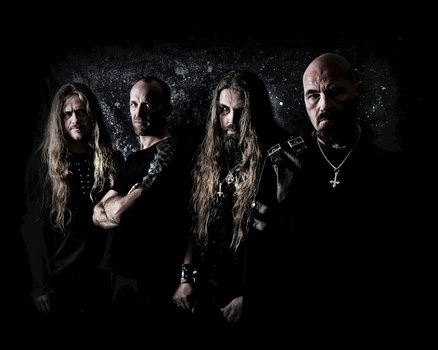
With ten albums and almost 30 years of experiences as a band, God Dethroned may not have the fan size of say, Cannibal Corpse, but they’ve always marched forward with their own brand of crushing death metal fury. Their newest album, Illuminati, sees the band head back into those familiar waters of anti-religion and occult topics after the last three WWI concept albums. Along with this lyrical return, the band has really attempted to switch some things up, adding more to the music such as keyboards and more varied vocals – all without showing any signs of compromise to their bludgeoning formula. We chatted with guitarist/vocalist Henri Sattler about all of these things, along with what keeps him going in extreme music, and even the road ahead.
Dead Rhetoric: What do you feel new guitarist Dave Meester brings to the band?
Henri Sattler: Dave only played guitar solos on the new album, because he joined after the recordings. Mike [Ferguson] participated on the writing and recording process, and then we did a European tour. But he couldn’t join, and he cancelled a few weeks before the tour. We had to find a new guitar player on the spot, basically. We found Dave, and he joined. He did a great job, and he is a really nice guy.
We suspected that we would have more problems with Mike not being able to join us on tour in the future, so we decided to keep Dave instead. The recordings were done, but Dave said that if it was possible he would like to record his own guitar solos so that when the album comes out, he could play his own instead of someone else’s. That made sense, and it turned out great.
Dead Rhetoric: How does Illuminati do things differently for God Dethroned?
Sattler: I guess it’s hard to say from my perspective. I’m not objective anymore since I’ve heard it so many times. But what we tried to do was to come up with catchy songs as usual. But we added more layers into the music this time. There’s a lot of keyboards – they are all in the background. They are there to just add layers to the songs, kind of like how Hypocrisy has been doing that. We are still a guitar-oriented band, but there’s a lot of keyboards just to lift the atmosphere.
We also did a lot of additional vocals. We did choirs, and we also did grunting and singing at the same time. All of those things added a lot to the atmosphere of the songs. So when people listen to the album for the first few times, they probably will just recognize them as they are, but the more often you listen to them, you will discover more of the backgrounds. There’s more layers to be discovered. I think that’s a big bonus for this album.
Dead Rhetoric: What’s the advantage of doing things in your home studio?
Sattler: The biggest advantage is that you can record without time pressure. When you book a studio, you can book it for a certain number of weeks, but everything has to be finished within that time. That means that if you want to experiment, like we did with keyboards and additional vocals like we did, there’s some time pressure. You are forced to accept things as they are, and not knowing if you could do a better job. In this case, we sat down with a keyboard player for days, and we tried all kinds of stuff. We could say that something fit best and throw away the other ideas. But if you work like that, it’s going to take a while before you can play the keyboards on the songs.
The same with the vocals. You try different things and see what is best. But when there’s time pressure, you see if it sounds good and just move on. The studio guy will say to me at 10AM that it’s time to start singing. At 10AM I’m not really in the mood for singing on an album. So recording at home, I can start recording at 10PM and go until 2AM – then I feel comfortable with it. Those are the big benefits of recording at home.
Dead Rhetoric: Was it freeing to go back into different lyrical topics after three WWI-themed albums?
Sattler: Definitely [laughs]! I had this idea for a WWI concept album back in the day, because the guitar player we had then, Isaac Delahaye, he lived in a territory in Belgium where a lot of fighting took place. There’s lots of museums, monuments, and graveyards – it was really intriguing. So I decided to write a concept album about WWI. It was received very well by the fans and the press, so I made the mistake of saying that I was going to make a trilogy of WWI albums [laughs]. Then we did Under the Sign of the Iron Cross, which was still doable.
But as time progressed, I found out that WWI was basically taking place in trenches, and people were shooting at each other from trenches for four years. So by the time I got to World Ablaze, the third one in the trilogy, it was so hard to come up with lyrics for that album. I was so happy that I was finished with it. And during that time, our fans basically suggested that we go back to the dark side, and write more religious/occult lyrics. So it was a big relief that I could do that again. To be finally free to have one topic per song instead of one topic per album. That was great.
Dead Rhetoric: You’ve got videos for “Spirit of Beelzebub” and the title track – what’s your approach to video-making at this point? You’ve been around in the scene long enough that you could have videos on TV, is there a different thought for using YouTube now?
Sattler: We realized that YouTube is really important, especially if you want to reach a younger fan base. But everybody is doing the typical band videos where you see the band playing, which is nice, but we tried to break away from it. At least for a couple of videos. So we looked at the lyrics of the new album, and looked at which songs we could represent in a video. Those were “Illuminati,” “Book of Lies,” and “Spirit of Beelzebub.” “Book of Lies” will be out on the day of the album’s release [February 7]. That one is more of a band video with a little bit of a concept of the first two videos in it. We really wanted to do something special, so we did these short movies where we would show what was being said in the lyrics. I like it a lot and the response has been good.
The only downside is that you can’t really promote it. You have to do it through Google advertisements, but Google says it’s too violent. So we can’t do it. So that limits the amount of views you can get. But with the third one, because it’s more of a band video, we can promote that one and it will drag the other two along with it.
Dead Rhetoric: I think it’s nice that you acknowledge that you can’t just keep doing things in the same old way. You have to shift and focus with what is going on, otherwise you end up becoming that legacy death metal band that only pulls in the 40-50 year olds instead of a younger crowd.
Sattler: Luckily, I can say that although we aren’t the biggest death metal band in the world, we always have a new and younger crowd in front of the stage. Of course there are those people in the 30s and 40s in the crowd as well, but we have a younger crowd and that’s pretty good because that means you can go on. If was playing to 45 year olds only, you know that your time is up basically. I wasn’t planning on giving up yet, so it’s good to have new fans sometimes.
Dead Rhetoric: With God Dethroned, it’s obviously quite brutal, but there are melodies there. What’s important when putting melodies into heavier music?
Sattler: I think that without a melody, a song isn’t a song. It depends on the point of view that you look at it. I grew up listening to melodic metal and rock bands. I love Iron Maiden. For me, it’s only logical to put melodies in the songs. To only have extreme riffing and blastbeats, it’s too boring for me, on a personal level. So we always try to put in as many melodies as possible. That’s what we did all the time. For me it’s just a natural thing.
Dead Rhetoric: What inspires you to keep moving forward with God Dethroned, almost 30 years in?
Sattler: I just like to play live. I don’t necessarily like to record albums – we record albums to be able to play live. Every once in a while, you need a new album to be able to play the festivals again and go on tour. When you are Iron Maiden, you can just play songs from your back catalog and people will love it. But when you are God Dethroned, you have to come up with something new every once in a while. That’s why we keep on doing it, because I love playing live so much.
Dead Rhetoric: Does God Dethroned seem like a part of your DNA at this point in your life?
Sattler: Yeah, I’ve played in this band for more than half of my life. It’s hard to say that it wouldn’t be important. It is my life, playing in a band. I always put everything aside for the band. If that’s a clever decision, I don’t know, but it’s something I’ve always done because I love it so much. I don’t want to give it up. When you give it up for real, it’s gone. I regret to miss it.
Dead Rhetoric: I’m assuming that feeling is what brought you back after those few years where band did split up.
Sattler: To be honest, in 2011 I was not in a good place personally. I felt tired, I needed a break. I wasn’t sure if I should take a break or quit. I felt that if I took a break, the questions about coming back to play live would never stop. If I quit, I thought I would have peace of mind. So I decided to quit. But it didn’t take very long to realize that it was a stupid decision. I can’t live without playing in a band. So I took my time to get back on my feet, and after three years, I knew it was time to restart the band and that’s what we did. I didn’t regret it at all.
Dead Rhetoric: Where did the inspiration come to make music that has a lot of layers like Illuminati has?
Sattler: It’s not that easy. On previous albums, there’s not as many layers. It’s much more straight-forward. But for this album, I decided that I wanted to put in more ideas. I get my inspiration from listening to bands like Pink Floyd. Our fans shouldn’t be worried – God Dethroned will never sound like Pink Floyd. But it’s something I like on a personal level. I like that music – it took me many years to get used to Pink Floyd. I hated that band when I was younger. But at a certain point, I guess it was after watching a live DVD, I was like, “Wow, this band is great!” All of a sudden I was hooked. They are a big source when it comes to layering in songs. That’s what they do. That’s why the music stays interesting for such a long time.
So that’s what I wanted to try this time, and the only thing that I hope is that people will give it time to discover all of the layers. Sometimes I worry that people listen to it a few times before moving onto the next band or something. I don’t know if it’s still the right time for people to stick to an album to get to know the album better.
Dead Rhetoric: That is tough. Within the scene it does feel that you have some people who are willing to do that, but then there’s also a portion that are going to listen to it on Spotify one time and then just go to the next thing.
Sattler: Yeah, there’s so many bands out there. It’s immense. You would think it would become less, but that’s not the case at all. The fact that albums don’t sell as much doesn’t mean that people don’t put out music. They just put it out on Spotify and YouTube. There are so many bands to check out. It’s a battle for survive.
Dead Rhetoric: What would you like to see from death metal as we go into the 2020s?
Sattler: Nowadays, I get the feeling that death metal is not doing all that well at the moment. I get the feeling that death metal has just become a genre within metal. Of course, there are still a few bands that do really well, but the majority are taken for granted. Many new fans are listening to these female-fronted bands, which is cool. I mean, it’s great music but I’m not going to change the style of the band. I’m going to play music that you expect to hear from a band called God Dethroned. That would make sense. I guess we can’t complain. We do good shows and play nice festivals. The last tour we did was with Suffocation and Belphegor. You can do it as long as the package is strong enough. But as a death metal band on your own, it’s tough out there right now.
Dead Rhetoric: Do you feel there’s any way for things to change, or is it just the way things are?
Sattler: Trends come and go, and they come and go faster than before. Something can become huge this year and be gone in two years from now. In the past, if a subgenre was to become popular, like death metal in say 1989, and it lasted until about 1995 when the peak was over. Now things come and go in a year or two. So there’s a lot of stuff coming, but they are going as well just as fast. You never know, there could be a death metal revival, but we have to accept that things have become more difficult nowadays.
Dead Rhetoric: Any upcoming plans for 2020 outside of the album release?
Sattler: The album comes out on February 7 and we have three album release shows in Germany and the Netherlands. Then a week later we start a European tour with Obscura. After that it will be another European tour or festivals, I’m not sure yet. We are already booked for a lot of festivals. Then we will tour Europe again, then South America, and hopefully the US as well. There’s going to be a lot of touring this year.
Dead Rhetoric: Well I hope you do manage to get over here!
Sattler: Me too! It depends on whether or not we can get on a good tour with a bigger band. That would make sense for us – with all of the costs of coming to America, we would need a big tour. That’s the only way it makes sense.











